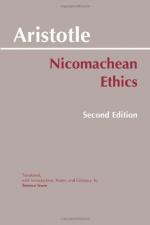|
This section contains 806 words (approx. 3 pages at 400 words per page) |

|
Part Four: On Human Servitude, Or, On The Strength of the Emotions Summary and Analysis
Part Four is not merely about emotions as a whole. The first few propositions concern the passions but then Spinoza moves to consider the active life; he wants to outline the nature of the active life and define the sense in which man can be free. Recall that Spinoza has already defined 'good' and 'bad' in terms of subjective pleasures and pain. He attacks the idea of final causes as the ground of goodness. He argues, in short, that final causes do not exist. Aristotle and many of those who followed him argued that every substance has a telos, or a natural aim. This is distinct from the 'endeavor' of a mode. Instead, it is part of the essence...
(read more from the Part Four: On Human Servitude, Or, On The Strength of the Emotions Summary)
|
This section contains 806 words (approx. 3 pages at 400 words per page) |

|




